代词专项
图片预览
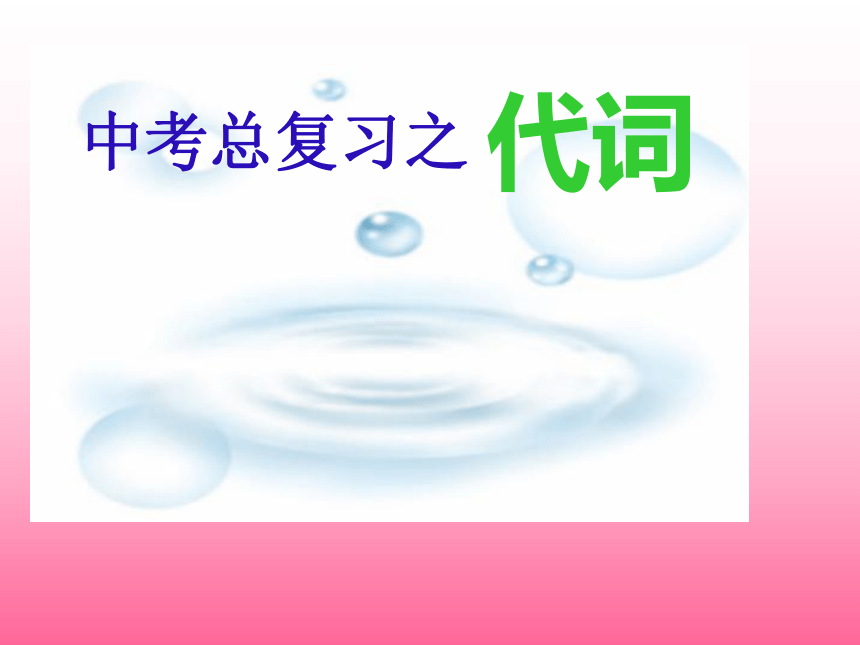
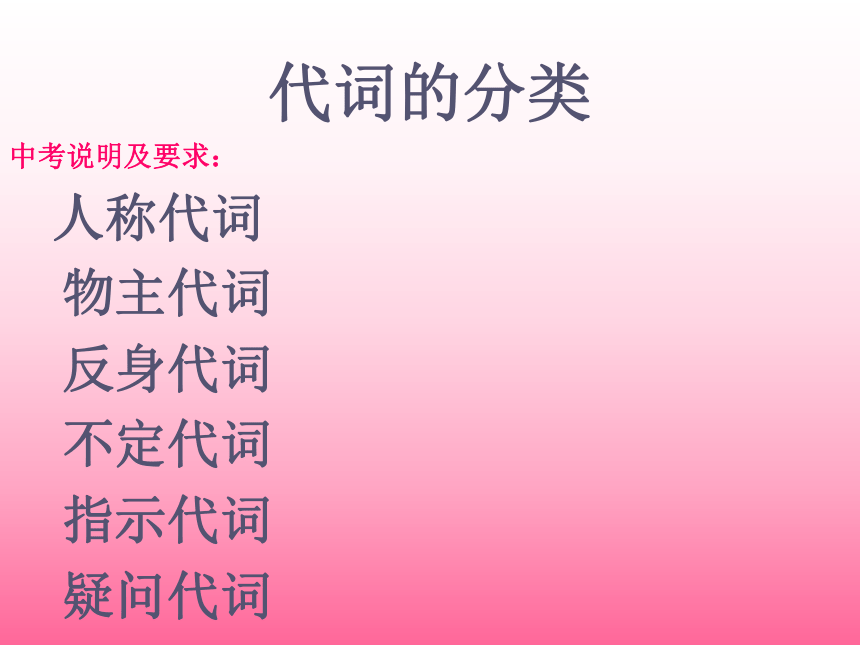
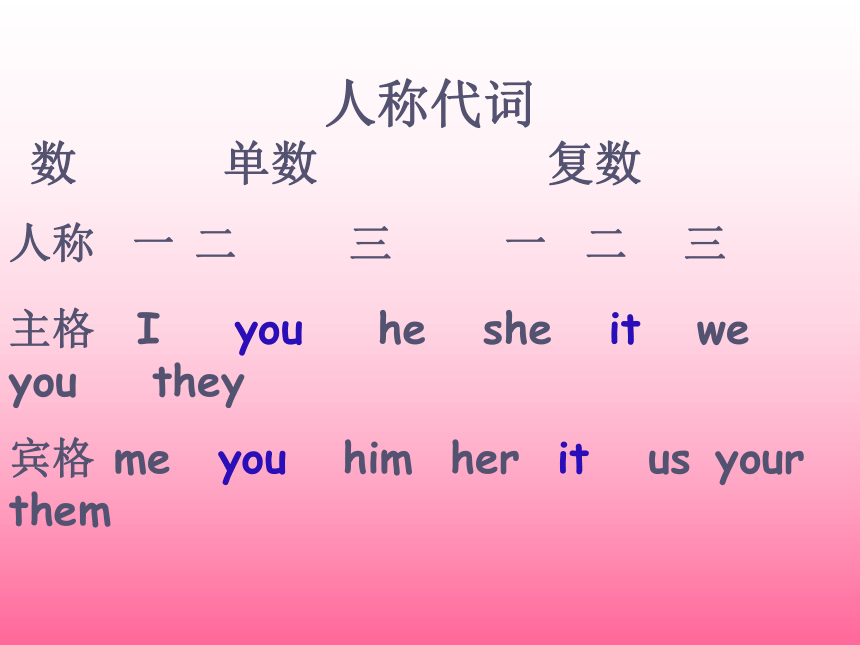
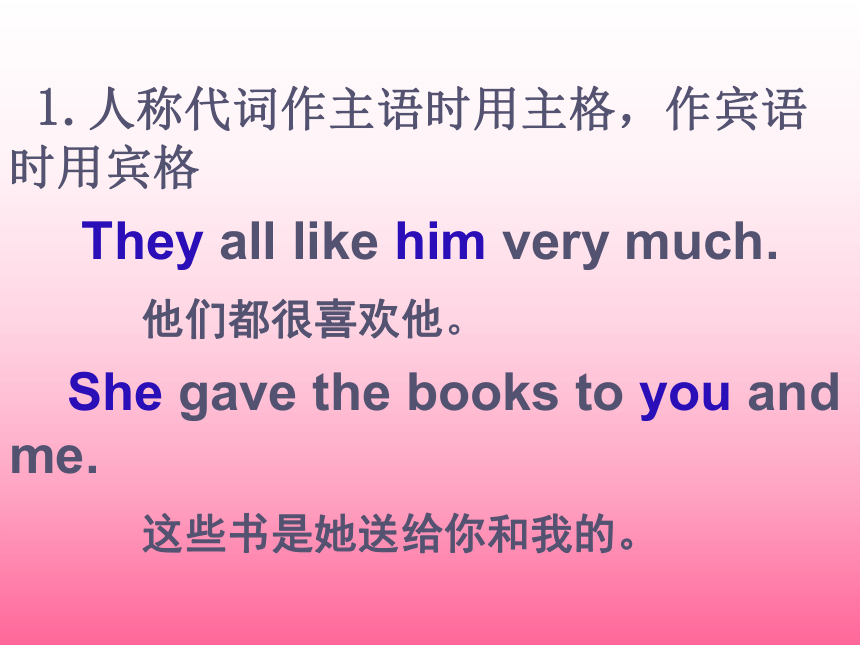
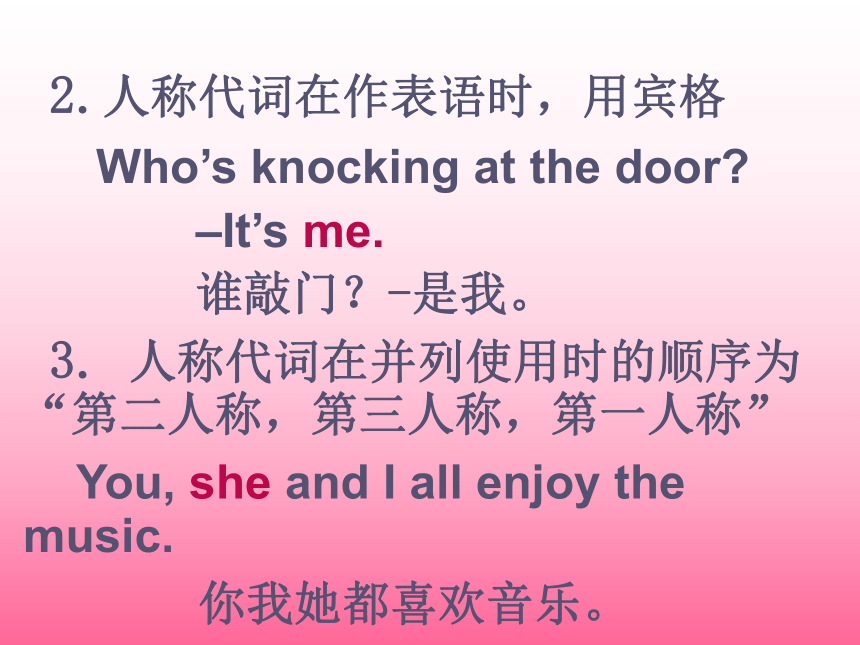

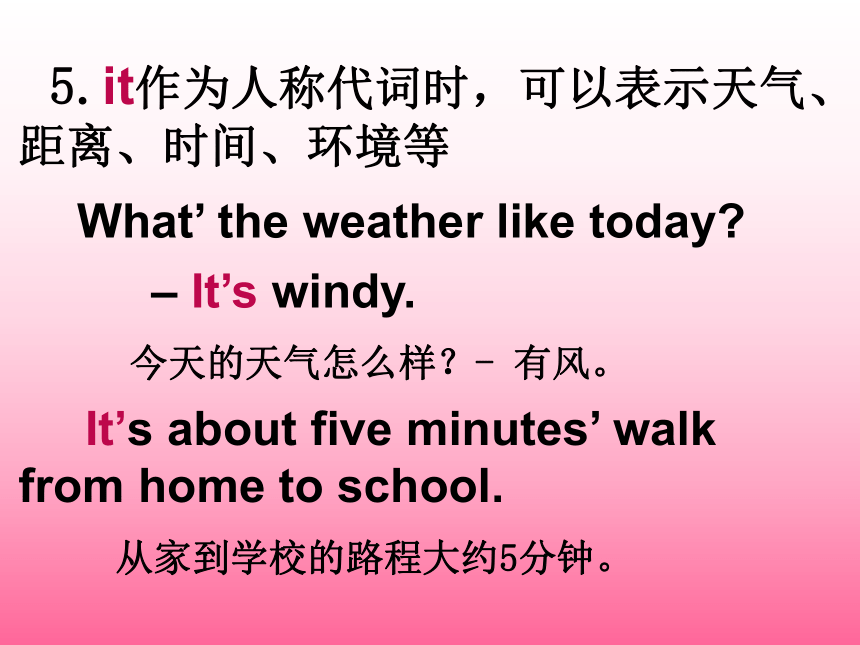
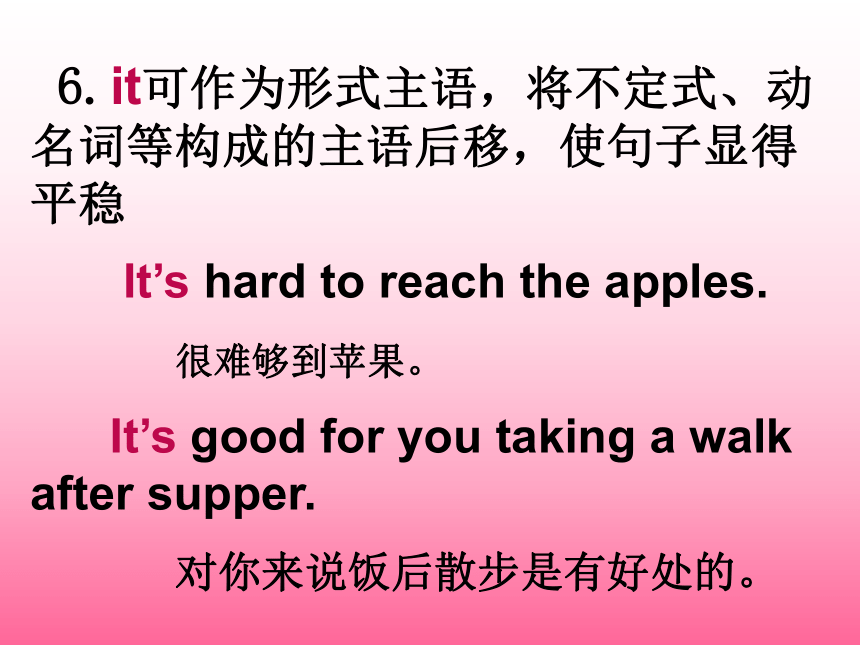
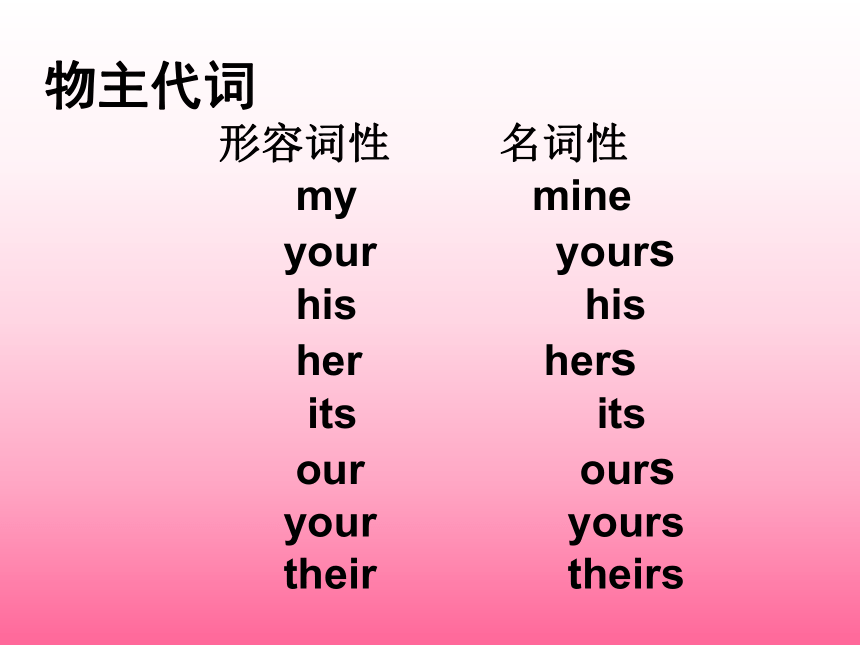
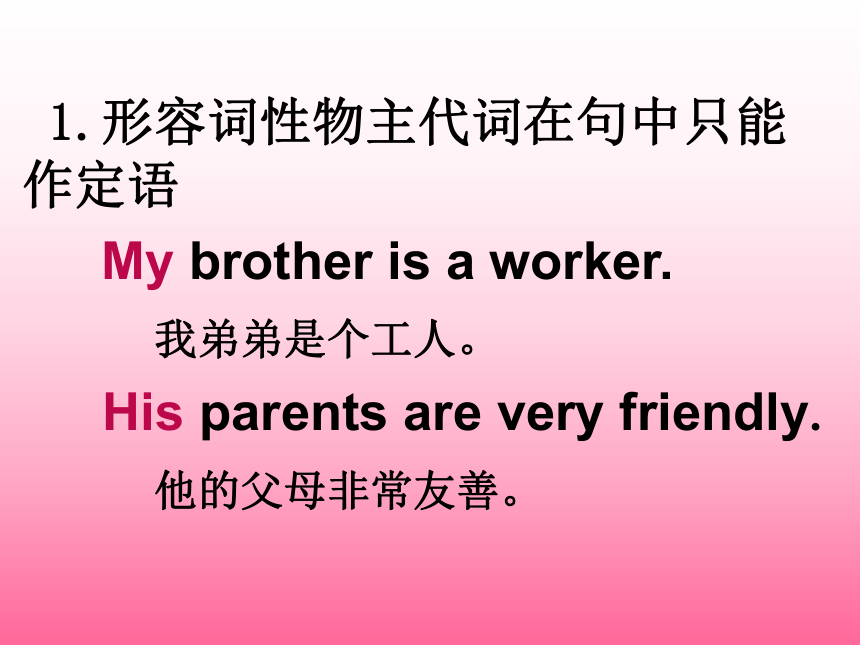
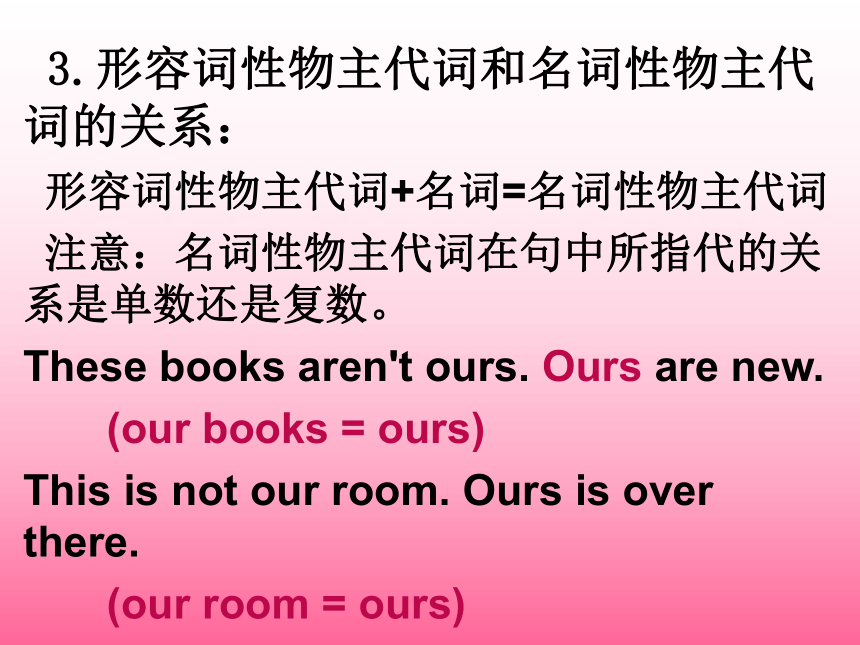
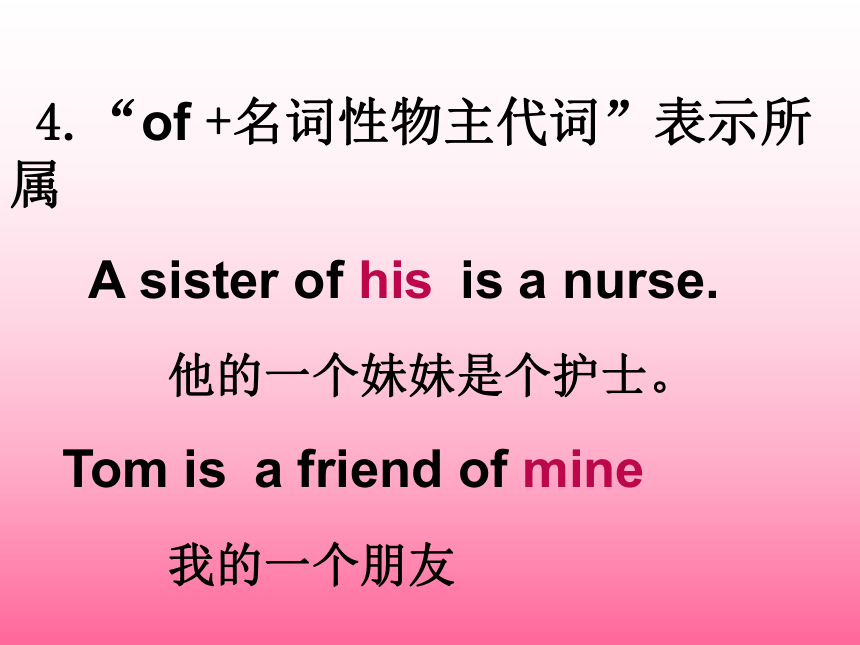
文档简介
(共47张PPT)
代词
中考总复习之
代词的分类
中考说明及要求:
人称代词
物主代词
反身代词
不定代词
指示代词
疑问代词
人称代词
数 单数 复数
人称 一 二 三 一 二 三
主格 I you he she it we you they
宾格 me you him her it us your them
1.人称代词作主语时用主格,作宾语时用宾格
They all like him very much.
他们都很喜欢他。
She gave the books to you and me.
这些书是她送给你和我的。
2.人称代词在作表语时,用宾格
Who’s knocking at the door
–It’s me.
谁敲门?-是我。
3. 人称代词在并列使用时的顺序为 “第二人称,第三人称,第一人称”
You, she and I all enjoy the music.
你我她都喜欢音乐。
4.she可以用来代表国家、船只、大地、月亮等
We love our motherland, we hope she’ll be stronger and bigger.
我们热爱我们的祖国,我们希望她更强大。
The ship is leaving. She’s on her first trip to Boston.
轮船要起航了。这是她第一次去波士顿。
5.it作为人称代词时,可以表示天气、距离、时间、环境等
What’ the weather like today
– It’s windy.
今天的天气怎么样?- 有风。
It’s about five minutes’ walk from home to school.
从家到学校的路程大约5分钟。
6.it可作为形式主语,将不定式、动名词等构成的主语后移,使句子显得平稳
It’s hard to reach the apples.
很难够到苹果。
It’s good for you taking a walk after supper.
对你来说饭后散步是有好处的。
物主代词
形容词性 名词性
my mine
your yours
his his
her hers
its its
our ours
your yours
their theirs
1.形容词性物主代词在句中只能作定语
My brother is a worker.
我弟弟是个工人。
His parents are very friendly.
他的父母非常友善。
3.形容词性物主代词和名词性物主代词的关系:
形容词性物主代词+名词=名词性物主代词
注意:名词性物主代词在句中所指代的关系是单数还是复数。
These books aren't ours. Ours are new.
(our books = ours)
This is not our room. Ours is over there.
(our room = ours)
4.“of +名词性物主代词”表示所属
A sister of his is a nurse.
他的一个妹妹是个护士。
Tom is a friend of mine
我的一个朋友
反身代词 单数
myself yourself himself herself itself
复数
ourselves yourselves themselves
1.反身代词在句中可以作宾语、表语和同位语
He thinks more of others than of himself.
他想到别人比想到自己更多一些。
That poor boy was myself.
那个可怜的孩子就是我自己。
He himself was a doctor.
他本人就是一个大夫。
I myself can work the problem out.
我能亲自算出这道题
2.反身代词有以下常见搭配
enjoy oneself = have a good time
by oneself = alone
help oneself to…
learn sth. by oneself =teach oneself sth.
注意:oneself 有单复数之分
* I enjoy myself.
* Children, help yourselves to some fish.
不定代词
不是指明代替特定名词(或形容词)的代词
all, each, every, both, either, neither
none, one, little, few, many, much
other, another, some, any, no
由some, any, no, every 等构成的合成代词
几组在用法上容易混淆的不定代词
1.some/any
some(一些,某)一般用于肯定句中
There are some flowers in front of the house.
any(一些,任何)多用于疑问句和否定句
Do you have any picture-books
注意:some有时也可用于表示请求、征求意见的疑问句中
Would you like some meat
你想要些肉吗?
May I ask some questions
我可以问问题吗?
Could I have some apples
我可以吃苹果吗?
Will you give me some water
你能给我些水吗?
2. many/much
many 修饰或指代复数名词
There are many eggs in the basket.
Many of us like playing games.
much 修饰或指代不可数名词
He doesn’t know much English.
3.another/other
another 泛指三个或三个以上中的另一个
I don’t want this coat. Please show me another.
other 后面接名词,泛指别的、其他的
Do you have any other questions
4. the other/others/the others
the other
1. 特指两个中的另一个
He has two sons. One is a worker, the other is a doctor.
2. 修饰名词,特指另一个、另一些
Tom likes swimming, and the other boys in his class like swimming, too.
others泛指其他的人或物
He often helps others.
Some are playing basketball, others are playing football.
the others 特指确定范围内剩下的全部人或物
There are fifty students in our class. Twenty of them are girls, the others are boys.
5.few/a few/little/a little
few/a few 修饰可数名词
little/a little 修饰不可数名词
few, little 表示否定意义, 译为“没有几个”,“没有多少”
a few, a little 表示肯定意义, 译为“有几个”,“有一点”
6.every/each
every+单数名词,表示“每一个”,强调共性、整体,只作定语,形式上为单数.不与of 连用
Every child likes playing games.
each 表示“每一个”,强调个性,作定语主语、宾语和同位语,常与of 连用
Each student was asked to try again.
Each of them has a nice skirt.
7.all/none
all “(全部)都”,表示三者或三者以上,作同位语时,一般放在连系动词、助动词之后,行为动词之前
We are all from Canada.
They all like English.
none “没有”,表示三者或三者以上都不,后常跟介词of(谓语动词单、复数均可)
None of us is/are afraid of dogs.
8.both/either/neither
both “(两者)都”,作主语时看作复数;作定语时后跟名词复数
My parents are both teachers.
=Both of my parents are teachers.
neither “(两者)都不”,含有否定意义,作主语时谓语用第三人称单数; 作定语时后跟名词单数
Neither answer is right.
either “两者中任何一个”,作主语时谓语用第三人称单数; 作定语时后跟名词单数
There are trees on either side of the street.
= There are trees on both sides of the street.
有关词组及应用
both of/either of/neither of
Both of them swim well.
他们俩都游得很好。
Either of you goes to Beijing.
你们俩随便谁去北京都可以。
Neither of them stopped to have a rest.
他们俩谁都不停下来休息。
both…and(谓语动词用复数形式)
either…or/neither…nor(谓语动词遵循就近原则)
Both Tom and Lucy are in Grade Two.
Tom 和 Lucy 都在二年级。
Either my father or my mother cooks at home.
或者我爸爸或者我妈妈在家烧饭。
Neither he nor I am free today.
我和他今天都没空。
9.Something/anything/nothing
Somebody/anybody/nobody
当形容词修饰这些不定代词时,常后置
I have something important to tell you.
Is there anything else in the box
Nobody can answer the question.
指示代词
表示空间和时间远近关系的代词 包括:this/that (单数) these/those (复数)
1. this,these指在方位上较近的人或物
that,those指在方位上较远的人或物
This is my shirt, that’s yours.
These TVs are made in China, those are made in Japan.
2.that,those常指前面提过的东西,以免重复
*These boxes are heavier than those on the desk.
3.刚才提到的事情,在英文中用that
*He was ill yesterday. I’m sorry to hear that.
疑问代词
用来构成特殊疑问句的代词 常见有:who whom whose what which 通常做主语\宾语\定语\表语
What makes you think like that \做主语\
Who(Whom) were you talking with \做宾语\
Which bus do I need \做定语\
What’s your father \做表语\
注意:在口语中,Who和Whom通用, 但在介词后只能用Whom
With whom did he play games
With who did he play games (错)
(2008年广东省汕头市)一Is that _____dog
—No .________is white.
A.his;His
B.her;Itis
C.he;His
D.her;Her
中考考什么
D
(重庆市2008年) We like Mr. Green because he often tells ______ funny stories in class.
A. we B. us
C. our D. ours
(重庆市2008年) — When shall we go to the museum, this afternoon or tomorrow morning
— ______ is OK. I’m free these days.
A. Both B. All C. Either D. Neither
(2008年天津市) —Is_____here
—No, John and Bob have asked for leave.
A. nobody
B. anybody
C. somebody
D. everybody
Try it out
( )1 Is this your football, boys
No, it is not ____
A. yours B. our C. mine D. ours
( )2 The bird builds ____ nest in the tree.
A. her B. its C. it’s D. hers
( )3 The maths problem ____ is wrong.
A. himself B. he C. itself D. herself
D
B
C
( )4 ____ want to see the film.
A Every student B Each student
C All of students D All the students
( )5 A lot of people have tried, but ____ have succeeded.
A. the few B. a few C. few D. little
( ) 6 ____ of the four roads will take you to the hospital.
A. Both B. Neither C. Any D. Either
D
C
C
( )7 I have five pencils, one is red, ____ is blue and ___ are green.
A. another, the other B. the other, others
C. others, the others D. another, the others
( ) 8 I have found ____ on the Internet.
A. a few informations B. a little informations
C. a few information D. a little information
D
D
( ) 9 I have Chemistry classes ____ day, Monday, Wednesday and Friday.
A. each other B. every other
C. this and other D. all other
( )10 -- ____ is the man under the tree
-- Jim’s father.
A. When B. What C. Where D. Who
B
D
11. This stick is ____.
A. him B. he C. his
12. He is always ready to help ____.
A. another B. the other C. others
13. ______ is Jack’s aunt.
A. He B. She C. It
14. She sent several cards to ____ of her friends.
A. some B. any C. no
15. _____ subjects do you have this term
A. Which B. Whose C. What
16. _____ of them has a computer.
A. Each B. Every C. All
17. Can your brother look after _____
A. himself B. him C. his
8 Which of _____ bikes is yours
A. this B. that C. these
19. _____ are good friends.
A. You, he and I B. She, you and I
C. I, you and he
20. She hasn’t brought _____ pen today. Will you
lend her _____
A. her, your B. hers, yours C. her, yours
21. Very _____ of them knew the hotel.
A. few B. little C. a few
22. The jacket is too short. Please show me ____.
A. other B. another C. one
23. Some city people grow vegetables _____.
A. herself B. himself C. themselves
用恰当的词填空。
I am a student. _____ name is Lily. I
often teach ________ English.
2. Tom is too young. Please look after
________.
3. He is fourteen. _____ name is Tom. This
book is ____. He can look after _______.
4. We’ll go fishing later. Would you like to
come with ______
5. Looking at the boys. _____ are playing
games. _______ names are Mike and
Bill. They enjoy ____________.
My
myself
him
His
his
himself
us
They
Their
themselves
代词
中考总复习之
代词的分类
中考说明及要求:
人称代词
物主代词
反身代词
不定代词
指示代词
疑问代词
人称代词
数 单数 复数
人称 一 二 三 一 二 三
主格 I you he she it we you they
宾格 me you him her it us your them
1.人称代词作主语时用主格,作宾语时用宾格
They all like him very much.
他们都很喜欢他。
She gave the books to you and me.
这些书是她送给你和我的。
2.人称代词在作表语时,用宾格
Who’s knocking at the door
–It’s me.
谁敲门?-是我。
3. 人称代词在并列使用时的顺序为 “第二人称,第三人称,第一人称”
You, she and I all enjoy the music.
你我她都喜欢音乐。
4.she可以用来代表国家、船只、大地、月亮等
We love our motherland, we hope she’ll be stronger and bigger.
我们热爱我们的祖国,我们希望她更强大。
The ship is leaving. She’s on her first trip to Boston.
轮船要起航了。这是她第一次去波士顿。
5.it作为人称代词时,可以表示天气、距离、时间、环境等
What’ the weather like today
– It’s windy.
今天的天气怎么样?- 有风。
It’s about five minutes’ walk from home to school.
从家到学校的路程大约5分钟。
6.it可作为形式主语,将不定式、动名词等构成的主语后移,使句子显得平稳
It’s hard to reach the apples.
很难够到苹果。
It’s good for you taking a walk after supper.
对你来说饭后散步是有好处的。
物主代词
形容词性 名词性
my mine
your yours
his his
her hers
its its
our ours
your yours
their theirs
1.形容词性物主代词在句中只能作定语
My brother is a worker.
我弟弟是个工人。
His parents are very friendly.
他的父母非常友善。
3.形容词性物主代词和名词性物主代词的关系:
形容词性物主代词+名词=名词性物主代词
注意:名词性物主代词在句中所指代的关系是单数还是复数。
These books aren't ours. Ours are new.
(our books = ours)
This is not our room. Ours is over there.
(our room = ours)
4.“of +名词性物主代词”表示所属
A sister of his is a nurse.
他的一个妹妹是个护士。
Tom is a friend of mine
我的一个朋友
反身代词 单数
myself yourself himself herself itself
复数
ourselves yourselves themselves
1.反身代词在句中可以作宾语、表语和同位语
He thinks more of others than of himself.
他想到别人比想到自己更多一些。
That poor boy was myself.
那个可怜的孩子就是我自己。
He himself was a doctor.
他本人就是一个大夫。
I myself can work the problem out.
我能亲自算出这道题
2.反身代词有以下常见搭配
enjoy oneself = have a good time
by oneself = alone
help oneself to…
learn sth. by oneself =teach oneself sth.
注意:oneself 有单复数之分
* I enjoy myself.
* Children, help yourselves to some fish.
不定代词
不是指明代替特定名词(或形容词)的代词
all, each, every, both, either, neither
none, one, little, few, many, much
other, another, some, any, no
由some, any, no, every 等构成的合成代词
几组在用法上容易混淆的不定代词
1.some/any
some(一些,某)一般用于肯定句中
There are some flowers in front of the house.
any(一些,任何)多用于疑问句和否定句
Do you have any picture-books
注意:some有时也可用于表示请求、征求意见的疑问句中
Would you like some meat
你想要些肉吗?
May I ask some questions
我可以问问题吗?
Could I have some apples
我可以吃苹果吗?
Will you give me some water
你能给我些水吗?
2. many/much
many 修饰或指代复数名词
There are many eggs in the basket.
Many of us like playing games.
much 修饰或指代不可数名词
He doesn’t know much English.
3.another/other
another 泛指三个或三个以上中的另一个
I don’t want this coat. Please show me another.
other 后面接名词,泛指别的、其他的
Do you have any other questions
4. the other/others/the others
the other
1. 特指两个中的另一个
He has two sons. One is a worker, the other is a doctor.
2. 修饰名词,特指另一个、另一些
Tom likes swimming, and the other boys in his class like swimming, too.
others泛指其他的人或物
He often helps others.
Some are playing basketball, others are playing football.
the others 特指确定范围内剩下的全部人或物
There are fifty students in our class. Twenty of them are girls, the others are boys.
5.few/a few/little/a little
few/a few 修饰可数名词
little/a little 修饰不可数名词
few, little 表示否定意义, 译为“没有几个”,“没有多少”
a few, a little 表示肯定意义, 译为“有几个”,“有一点”
6.every/each
every+单数名词,表示“每一个”,强调共性、整体,只作定语,形式上为单数.不与of 连用
Every child likes playing games.
each 表示“每一个”,强调个性,作定语主语、宾语和同位语,常与of 连用
Each student was asked to try again.
Each of them has a nice skirt.
7.all/none
all “(全部)都”,表示三者或三者以上,作同位语时,一般放在连系动词、助动词之后,行为动词之前
We are all from Canada.
They all like English.
none “没有”,表示三者或三者以上都不,后常跟介词of(谓语动词单、复数均可)
None of us is/are afraid of dogs.
8.both/either/neither
both “(两者)都”,作主语时看作复数;作定语时后跟名词复数
My parents are both teachers.
=Both of my parents are teachers.
neither “(两者)都不”,含有否定意义,作主语时谓语用第三人称单数; 作定语时后跟名词单数
Neither answer is right.
either “两者中任何一个”,作主语时谓语用第三人称单数; 作定语时后跟名词单数
There are trees on either side of the street.
= There are trees on both sides of the street.
有关词组及应用
both of/either of/neither of
Both of them swim well.
他们俩都游得很好。
Either of you goes to Beijing.
你们俩随便谁去北京都可以。
Neither of them stopped to have a rest.
他们俩谁都不停下来休息。
both…and(谓语动词用复数形式)
either…or/neither…nor(谓语动词遵循就近原则)
Both Tom and Lucy are in Grade Two.
Tom 和 Lucy 都在二年级。
Either my father or my mother cooks at home.
或者我爸爸或者我妈妈在家烧饭。
Neither he nor I am free today.
我和他今天都没空。
9.Something/anything/nothing
Somebody/anybody/nobody
当形容词修饰这些不定代词时,常后置
I have something important to tell you.
Is there anything else in the box
Nobody can answer the question.
指示代词
表示空间和时间远近关系的代词 包括:this/that (单数) these/those (复数)
1. this,these指在方位上较近的人或物
that,those指在方位上较远的人或物
This is my shirt, that’s yours.
These TVs are made in China, those are made in Japan.
2.that,those常指前面提过的东西,以免重复
*These boxes are heavier than those on the desk.
3.刚才提到的事情,在英文中用that
*He was ill yesterday. I’m sorry to hear that.
疑问代词
用来构成特殊疑问句的代词 常见有:who whom whose what which 通常做主语\宾语\定语\表语
What makes you think like that \做主语\
Who(Whom) were you talking with \做宾语\
Which bus do I need \做定语\
What’s your father \做表语\
注意:在口语中,Who和Whom通用, 但在介词后只能用Whom
With whom did he play games
With who did he play games (错)
(2008年广东省汕头市)一Is that _____dog
—No .________is white.
A.his;His
B.her;Itis
C.he;His
D.her;Her
中考考什么
D
(重庆市2008年) We like Mr. Green because he often tells ______ funny stories in class.
A. we B. us
C. our D. ours
(重庆市2008年) — When shall we go to the museum, this afternoon or tomorrow morning
— ______ is OK. I’m free these days.
A. Both B. All C. Either D. Neither
(2008年天津市) —Is_____here
—No, John and Bob have asked for leave.
A. nobody
B. anybody
C. somebody
D. everybody
Try it out
( )1 Is this your football, boys
No, it is not ____
A. yours B. our C. mine D. ours
( )2 The bird builds ____ nest in the tree.
A. her B. its C. it’s D. hers
( )3 The maths problem ____ is wrong.
A. himself B. he C. itself D. herself
D
B
C
( )4 ____ want to see the film.
A Every student B Each student
C All of students D All the students
( )5 A lot of people have tried, but ____ have succeeded.
A. the few B. a few C. few D. little
( ) 6 ____ of the four roads will take you to the hospital.
A. Both B. Neither C. Any D. Either
D
C
C
( )7 I have five pencils, one is red, ____ is blue and ___ are green.
A. another, the other B. the other, others
C. others, the others D. another, the others
( ) 8 I have found ____ on the Internet.
A. a few informations B. a little informations
C. a few information D. a little information
D
D
( ) 9 I have Chemistry classes ____ day, Monday, Wednesday and Friday.
A. each other B. every other
C. this and other D. all other
( )10 -- ____ is the man under the tree
-- Jim’s father.
A. When B. What C. Where D. Who
B
D
11. This stick is ____.
A. him B. he C. his
12. He is always ready to help ____.
A. another B. the other C. others
13. ______ is Jack’s aunt.
A. He B. She C. It
14. She sent several cards to ____ of her friends.
A. some B. any C. no
15. _____ subjects do you have this term
A. Which B. Whose C. What
16. _____ of them has a computer.
A. Each B. Every C. All
17. Can your brother look after _____
A. himself B. him C. his
8 Which of _____ bikes is yours
A. this B. that C. these
19. _____ are good friends.
A. You, he and I B. She, you and I
C. I, you and he
20. She hasn’t brought _____ pen today. Will you
lend her _____
A. her, your B. hers, yours C. her, yours
21. Very _____ of them knew the hotel.
A. few B. little C. a few
22. The jacket is too short. Please show me ____.
A. other B. another C. one
23. Some city people grow vegetables _____.
A. herself B. himself C. themselves
用恰当的词填空。
I am a student. _____ name is Lily. I
often teach ________ English.
2. Tom is too young. Please look after
________.
3. He is fourteen. _____ name is Tom. This
book is ____. He can look after _______.
4. We’ll go fishing later. Would you like to
come with ______
5. Looking at the boys. _____ are playing
games. _______ names are Mike and
Bill. They enjoy ____________.
My
myself
him
His
his
himself
us
They
Their
themselves
同课章节目录
- 词法
- 名词
- 动词和动词短语
- 动词语态
- 动词时态
- 助动词和情态动词
- 非谓语动词
- 冠词
- 代词
- 数词和量词
- 形容词副词及其比较等级
- 介词和介词短语
- 连词和感叹词
- 构词法
- 相似、相近词比较
- 句法
- 陈述句
- 一般疑问句和否定疑问句
- 特殊疑问句及选择疑问句
- 反意疑问句
- 存在句(There be句型)
- 宾语从句
- 定语从句
- 状语从句
- 主谓一致问题
- 简单句
- 并列句
- 复合句
- 主谓一致
- 主、表语从句
- 名词性从句
- 直接引语和间接引语
- 虚拟语气
- 感叹句
- 强调句
- 倒装句
- 祈使句
- 句子的成分
- 句子的分类
- 题型专区
- 单项选择部分
- 易错题
- 完形填空
- 阅读理解
- 词汇练习
- 听说训练
- 句型转换
- 补全对话
- 短文改错
- 翻译
- 书面表达
- 任务型阅读
- 语法填空
- 其他资料
